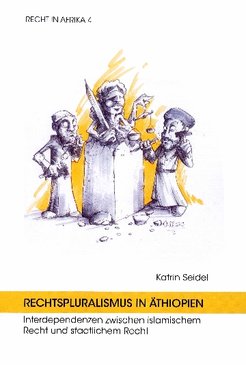Rechtspluralismus in Äthiopien. Interdependenzen zwischen islamischem Recht und staatlichem Recht

AutorIn
Katrin Seidel
Verlag
Köln: Rüdiger Köppe Verlag
Jahr der Veröffentlichung
2013
ISBN
978-3-89645-624-3
OPAC
Abstract
The empirically informed study on legal pluralism in Ethiopia, i.e. on the interdependent relationships between Islamic law and state law seeks to contribute to a broader understanding of law. It focusses on transformation processes of legal concepts, procedures, and practices within the pluralistic normative legal orders of Ethiopia.
The study’s emphasis on the state-recognised legal pluralism allows examining the complex interactions of state and Islamic normative orders, especially the relationships of their respective judicial institutions.
In order to not entirely relinquish the authority for co-regulating the private sphere and to mediate/regulate the relationships between diverse legal orders, the Ethiopian state has developed its own modes of state-endorsed legal pluralisms: Since 1995 the application of Islamic law by Sharia courts on specified personal and family matters has been accorded constitutional recognition for the first time in Ethiopian legal history. In the negotiation process, arising interdependencies as well as normative conflicts have triggered the development of a set of conflict rules and conflict reso¬lution mechanisms.
Based on the analytical framework of legal pluralism, the study applies an “integrated social scientific approach to law in society”, categorizing concepts of cognitive and normative nature in order to show the change of the legal status of Ethiopian Sharia courts and their de jure recognition.
The study is built on two periods of fieldwork in Ethiopia in 2008 and 2009. The main research foci are the Sharia courts in Addis Abäba, Dǝrre Dawa and Harär. The methodology of the study is based on qualitative techniques drawn from the social sciences. In addition to the qualitative content analysis of text material (legal documents, judicial court records, etc.), semi-structured oral interviews and participant observation were conducted. Primary and secondary sources were analysed through the lenses of legal interpretation and comparison techniques of legal documents, by content analysis of oral and text material and by critical-historical method and interpretation.
The study shows that continuous negotiations and mutual adaptation processes emerge out of the tensions and inherent norm conflicts between Islamic and state normative orders. The negotiations are the result of divergent legal perceptions and values, e.g., with regard to state funding of Sharia courts – secularism (strict vs. principled distance), voluntary jurisdiction of Sharia courts (explicit vs. implicit consensus of the parties), the Civil Procedure Code of Ethiopia – Islamic Procedure Law (testimony), marriage age, polygyny, local and religious dispute regulation mechanisms and many other.
